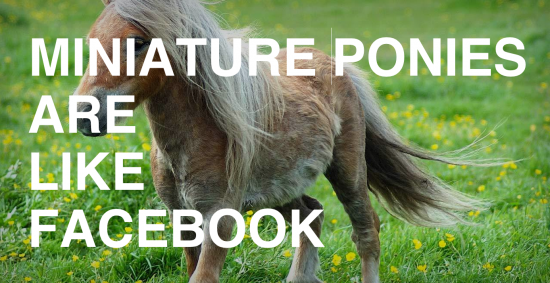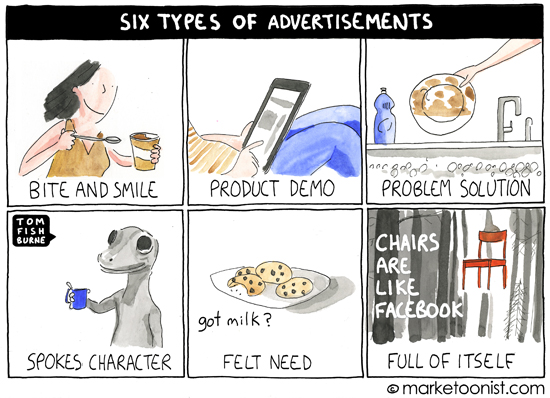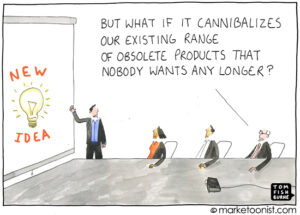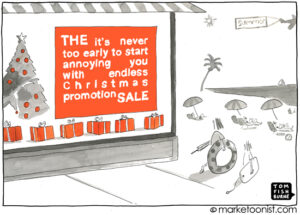Facebook debuted its first ad campaign ten days ago to celebrate its one billion user milestone. The ad has been ridiculed and parodied for it’s confusing and overwrought story centered on the message, “Chairs are like Facebook”. It’s one of the more inadvertently hilarious pieces of marketing communication I’ve seen.
My favorite spoof so far is arelikefacebook.com, a site that lets you pick random words to automatically generate a Facebook ad.

It is ironic that the poster brand for social would lead with such a self-indulgent advertisement. The spot is expensively produced by the director of Babel and obviously shot in several different countries. It tries to tug at the heart strings and completely misses the mark. After chairs, the spot moves on to the cosmos: “The universe. It is vast. And dark. And makes us wonder if we are alone.”
Many brands take themselves too seriously, particularly in emotional advertising. The Facebook ad is a reminder to marketers not to be so full of ourselves.
Google Chrome faced a similar challenge as Facebook. It needed to bring emotion to technology and communicate how they transform the lives of their audiences. But rather than abstract tedious analogies, Google shared stories.
(Marketoonist Monday: I’m giving away one signed print of this week’s cartoon. Just share an insightful comment to this week’s post by 5:00 PST on Monday. I’ll pick one comment. Thanks!)



Tessa Stuart says
Oh dear. Facebook ignoring the basic rules of communication there, and Google Chrome embracing them and drawing you in with the premise of the student away from home and the parent. A universally applicable situation of children leaving home, and a situation I recognise, as it’s mine, currently. Pictures show the story, and just a few words, typed in the Chrome story, amplify it. Facebook over-complicates and distracts and is over-serious, when we all know the point of Facebook is sharing pictures and stories and jokes, with friends and family. And actually, not a lot more than that. Did they not test the Facebook campaign for comprehension and emotional engagement before airing? If not, why not? What a waste of money.
chris Jangelov says
They forgot the most obvious one: Dictators are like Facebook. They want to know where you are. They read your diary. They decide who you can play with and who you dont need to listen to. They tell your secrets. Like in victorian England they don’t let you watch skin. They give you bread and circuses to occupy your time and keep you from having and voicing an opinion. They declare that they are the first leaders av a great new world that will lead to maximum happiness. They are, as always, wrong.
George Foster says
A word from the slightly less schmaltzy side of the Pond – yes Chrome does it a lot better, though that accoustic guitar soundtrack is getting so over used now to denote homely thoughts… Certainly harder to set up a spoof one for their’s rather than the oh so inviting Chairs one that FB have gone for. An open invitation! What were they thinking of?
Can’t wait to post the arelikefacebook.com link on MY Facebook page.
Stephen Macklin says
This is what happens when a bunch of marketers get in a room and decide that rather than do the work to create something unique and different they are going to try to create their own version of Think Different. Only Better.
It reminds me of the 90’s when every logo had to have some type of swoosh or swash because Nike had one and it was successful.
The result is overwraught derivative failure.
Stephanie Deschenes says
I’m not sure I understand why Facebook thought it needed an ad at all. They have a billion users, so clearly it’s not an awareness issue. They are at the top of the social media pile, so they don’t need to steal users from someone else. I don’t get the reason behind it.
Patrick Masi says
I’d guess the reason for an ad is to drive positive public sentiment, which in turn helps drive positive media coverage, which helps drive stock price back in the other direction.
If you don’t work to change a negative storyline, then it becomes a narrative that is incredibly difficult to change as time goes on. See Microsoft. I personally think their products have never been better, but you wouldn’t know it because the blue-screen-of-death storyline is still the operative one in people’s heads.
Patrick Masi says
Also – it’s probably about driving everyday usage, too. Having lots of users doesn’t do you any good if people start getting swayed to use other networks and you start losing advertising eyeballs.
That said – if you’re trying to drive usage, maybe you should show use scenarios, as Google did 🙂
Drew Hawkins says
I think the single difference in Facebook’s ad versus Google’s involved focus. In Facebook’s ad, they tried to position themselves as the center of the universe. Google took an alternative route and put the end user at the center of the universe. When a message talks about its audience more than its messenger, it’s typically better received.
Jennifer Nelson says
Thanks for a(nother) great post Tom, and Chris Jangelov – thanks for the LOL. Have a great week everyone! Jen
Susie says
The best part of the ad is it reminds you how much more fulfilling it can be to get off Facebook, get offline and get out in the real world to connect with people.
Nate Challen says
That Google spot makes me angry as I sit there wonder “How is that I’m crying about an ad for web browser?” Fantastic work.
Julie C says
Google pulled off the “Hallmark Card” moment. Remember their ads from years ago that made you tear up about giving your mom the right Mothers Day card? Facebook’s ad literally said, get off Facebook and interact with the world around you cause you are wasting time online. Sorry, but seeing the chair also just made me think of the Clint Eastwood “chat with the Chair” at the Republican convention.
Joseph says
I hadn’t seen that google ad yet, but it’s pretty amazing. I also love this one:
http://youtu.be/R4vkVHijdQk
We don’t care about how great facebook is, we care about how it makes things easier/better. Same with google.
Tammy A. says
What’s interesting is that they had the opportunity to do a social campaign to determine how best to celebrate this milestone. They missed using their own platform and technology.
Given all of Facebook’s press lately, it seems that they were trying to humanize themselves, and isn’t the best way to do that to talk to the billion people who are using your service? Isn’t social all about getting people to be your brand voice?
edwin says
Facebook accomplished it’s mission because it got us talking about it. Conversations that surrounds an ad is priceless. Not sure if it was intended to be that way…but it sure is a success.
Scott says
Hmmm. It’s trying pretty hard, yes, but its at least an attempt to answer why oh why does Facebook work so well. That is a cosmological question.
Boris Borchert says
Thank you for this one. I had a discussion about this facebook spot. someoene said it was amazing and I just couldn´t figure out why it should be amazing. I am glad i am not the only one finding the facebook add a failure. it becomes much more clear in comparrison to the Chrome add. My favorite lately was one from P&G. The budget should be a near level like the facebook add and it is not cheap produced either. http://www.youtube.com/watch?v=NScs_qX2Okk
David Heys says
Did you realise that the music behind the Google ad is titled “Broken chair”? Check the YouTube video description. Coincidence?
Tom Fishburne says
Hi all,
Really great perspective this week! Many thanks! This week’s print goes to Drew Hawkins. I think he nailed the distinction with which company puts what at the center of the universe. It’s a good question for any brand to ask.
Thanks!
-Tom
Alex Kitchens says
I’ve noticed this type of marketing becoming more popular: Take something simple and make it profound. Spotify recently had an ad like this too – “Let’s talk, because that’s what people do.” I’m guessing it reaches the audience of people who are known to overcomplicate ideas and sound wise.
Ryan Chatterton says
Honestly, the Facebook ad, while a little off with the “chairs are like Facebook” reference, wasn’t nearly as bad as everybody is making it out to be.
It actually made me feel emotional at one point.
Maybe, as marketers, we’re just a little too biased?
Let’s not forget that this ad is NOT for us.
Katherine Horrocks says
Facebook’s ridiculous ad is like the painfully horrifying real world version of the “Veridian” ad snippets from Better Off Ted (miss that show so much!) – it’s hard to understand how this got past so many decision makers and out to the public without a big red flag going up!
Charles Edwards says
How are chairs like Facebook? Not that many ways actually.
For one things, chairs don’t try and make money out of selling your data, and don’t have confusing and rapidly shifting privacy policies, such that you’re not really sure what you’ve been opted into or out of since the last time you checked. Chairs don’t also also start to become rather creepy when you think about them. I’ve also never felt the need to “unfriend” a chair because I’m worried about the creepyness.
Eric says
I kind of like the facebook ad. But maybe it could have been better with an opening that introduce the Universe before the chairs. I dont know how marketting guys think but in story telling like novel or comic book we must deffine rules of the story as soon as possible just to be sure nobody feel that the rules are broken by the end of the story.
So in that case the “universe thing” break the whole simple chair that was introdused at start, I think.